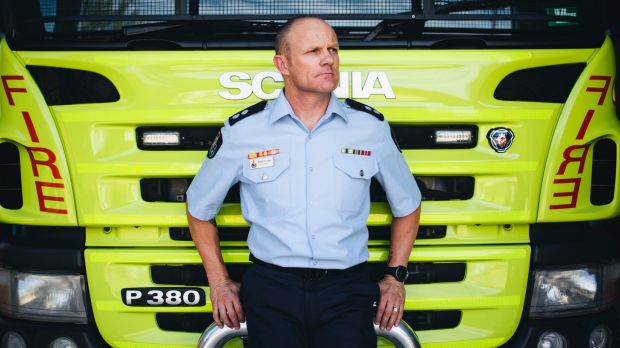Agonising chest pain. Shortness of breath. Cold sweats. Crushing anxiety.
When these symptoms woke a Canberra firefighter in the middle of the night, he was convinced they signalled a heart attack and impeding death.

"I had no idea what was happening," Rob Thompson said.
"I'd been a firefighter for five years and was with the navy for 10 years before that but never had any anxiety. Then all of a sudden this rocks me."
Over time, Mr Thompson came to learn that panic attacks he suffered regularly from then on were due to a cumulative exposure to trauma.
Despite PTSD research focusing much more on the military than emergency workers, horrors of the emergency frontline haunt Mr Thompson more than those he faced on the battlefield. The dim spotlight on emergency trauma has left many emergency workers with limited knowledge of the very condition they could be experiencing.
Over all the years spent jumping out of helicopters and racing into fires, Mr Thompson thought he was bulletproof.
But with the panic attacks came out-of-character behaviour such as taking six-hour bike rides that he thought went for 30 minutes, and sitting on a mountain top all day, starring into the distance. He suffered a relationship breakdown after losing the ability to show emotion and experienced re-occurring nightmares.
As his mind slowly broke down, he realised even firefighters weren't superhuman.
The realisation came when he finally accepted that one particular tragedy had scarred him deeper than most. A teenage motorcyclist was killed after drag-racing and crashing into a car.
Mr Thompson arrived before paramedics, minutes after the crash, and was tasked with first aid. The boy looked about 17.
"I thought, this kid had his whole life ahead of him but because of one stupid mistake, his life is done," he said.
"That one had a horrific ending and it really stuck with me."
Soon after, he found himself leading CPR on a woman who was in cardiac arrest, again when paramedics were not readily available. He said her face the moment she died will always be ingrained in his mind.
After being diagnosed with PTSD, Mr Thompson was ashamed. But research lead him to see it as any physical injury.
"If I was to walk around work with a bandage on my arm everyone would be sympathetic, but because I look find and it's in my mind, people go 'there's nothing wrong with this guy'," he said.
He also began to understand it wasn't just the tragedies he witnessed that wore him down, but his caring nature.
"I still think about jobs and think - could I have done something differently?"
"Maybe I'm too compassionate. Compassionate people are drawn to emergency work, but what that means for being resilient to suffering mental illness, I don't know."
Through his recovery, Mr Thompson had become an advocate for improving the education of mental health in emergency services.
He hoped sharing his story would help increase the understanding of PTSD among colleagues, as understanding of the condition earlier could have to seeking help earlier.
The ACT Fire and Rescue boss Mark Brown was confident the ACT Emergency Service Agency's new welfare package and peer support program would benefit many staff in need of more support.
But as emergency service agencies were only beginning to understand the long-term effects of the traumatic job, he believed they could do more in preparing candidates for the difficult work.
"We could look at having better screening tools to identify those people who may be more at risk of developing things like PTSD and ensuring that we select out those people where emergency services might not be the best career option," Mr Brown said.
"But if it is, it's about how we actually prepare and support those people with their career."


